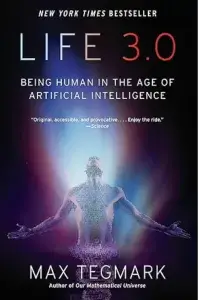
Introduction
The evolution of artificial intelligence (AI) has become a central topic in contemporary discourse, impacting various aspects of our lives and societal structures. Max Tegmark, a prominent physicist and AI researcher, delves into these themes in his thought-provoking book, “Life 3.0: Being Human in the Age of Artificial Intelligence.” In this review, we will explore the book’s key insights, themes, and implications for our future.
Author Background and Credentials
Who is Max Tegmark?
Max Tegmark is a professor at the Massachusetts Institute of Technology (MIT) and a co-founder of the Future of Life Institute, an organization dedicated to mitigating existential risks from advanced technologies, including AI. His interdisciplinary background spans physics, cosmology, and AI, making him well-positioned to comment on the intersection of these fields. His previous works, including “Our Mathematical Universe,” highlight his expertise and unique approach to understanding complex scientific concepts MIT.
The Importance of Tegmark’s Perspective
Tegmark’s perspective on AI is critical because he argues that we are on the brink of a transformation that will redefine what it means to be human. His insights draw from a blend of scientific knowledge and philosophical inquiry, prompting readers to think deeply about the implications of AI advancements.
Overview of “Life 3.0”
Core Concept of Life 3.0
The term “Life 3.0” refers to the third stage of life on Earth, characterized by the creation of entities that can design themselves and their environment. This concept challenges our traditional notions of life and intelligence, raising profound questions about the future of consciousness and existence OpenAI.
Structure of the Book
The book is structured in a manner that guides readers through various themes associated with AI, from its potential to revolutionize work to ethical quandaries and existential risks. Each chapter builds on the last, culminating in a vision of a future where humanity must navigate the complexities of coexistence with advanced AI systems.
Key Themes and Ideas
The Future of Work
Tegmark discusses how AI is likely to reshape job markets across various sectors. He questions what work will look like when machines can perform tasks more efficiently than humans, urging readers to contemplate a future where job displacement is a significant concern. The automation of tasks could lead to a reassessment of human roles within the economy World Economic Forum.
Ethical Considerations
The moral dilemmas surrounding AI development are a central focus of the book. Tegmark emphasizes the responsibility of AI creators to ensure that their technologies are aligned with human values. He raises critical questions about bias, accountability, and the decision-making processes embedded within AI systems, which are crucial discussions in today’s tech landscape AI Ethics.
AI and Society
Tegmark examines the social implications of AI integration and how it might alter interpersonal relationships and societal norms. The book postulates that while AI can enhance connectivity, it may also risk exacerbating existing social divides if not managed carefully Social Impacts of AI.
Existential Risks and Opportunities
The dual nature of AI as both a potential threat and an opportunity is a recurrent theme. Tegmark argues that while advanced AI poses significant risks—such as the potential for misuse or uncontrollable outcomes—it also opens doors to groundbreaking opportunities for solving global issues, from healthcare to climate change Future of Life Institute.
Analysis of Writing Style and Audience
Accessibility of Content
Tegmark’s writing is notable for its clarity and accessibility, making complex scientific ideas digestible for a broad audience. He effectively uses analogies and vivid examples to ground his arguments, inviting readers from various backgrounds to engage with the content.
Target Audience
“Life 3.0” is aimed at both the informed layperson and professionals in the fields of AI and ethics. Its interdisciplinary approach appeals to readers interested in technology, philosophy, economics, and sociology, encouraging a diverse audience to consider the implications of AI on society.
Personal Reflections
Key Takeaways
What resonated with me most from “Life 3.0” was Tegmark’s call to proactively shape our future with AI. His optimism about the potential for good is tempered by a realistic acknowledgment of the challenges we face, prompting a deeper reflection on our collective responsibilities as AI stakeholders.
Critique of the Book
While “Life 3.0” is an insightful exploration of AI’s future, some arguments could benefit from more empirical grounding. Certain speculative scenarios, while thought-provoking, may require stronger evidence or case studies to enhance their persuasiveness.
Implications for the Future
Relevance in Today’s AI Landscape
The themes presented in “Life 3.0” are increasingly relevant as we witness rapid advancements in AI technology. The discussions around job displacement, ethical guidelines, and societal impacts are crucial as we navigate our current technological landscape.
Encouraging Further Discussion
Tegmark’s work serves as a catalyst for ongoing discussions about the role of AI in our lives. It encourages readers to engage with the moral and ethical dimensions of AI development, pushing for a more nuanced understanding of technology’s influence on humanity.
Conclusion
In conclusion, “Life 3.0: Being Human in the Age of Artificial Intelligence” is a compelling exploration of the intersection between AI and humanity. Tegmark’s insights challenge us to envision a future where we must coexist with intelligent systems, urging us to consider the ethical, societal, and existential implications of our technological choices. This book is a must-read for anyone interested in the future of technology and its impact on society.
Next steps
I encourage readers to share their thoughts on AI and Max Tegmark’s “Life 3.0.” What implications do you see for the future of work, ethical considerations in AI, or societal changes? Additionally, for those looking to dive deeper into these themes, I recommend exploring other works related to AI ethics and the future of technology.







